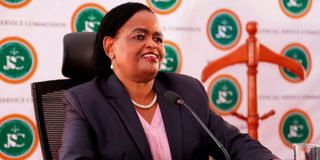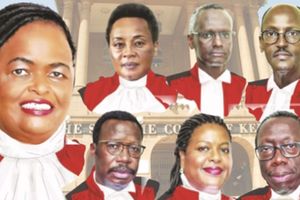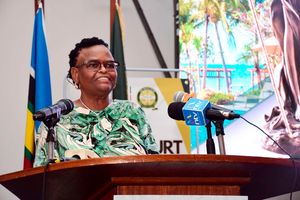
Chief Justice Martha Koome.
Chief Justice Martha Koome has appointed a three-judge bench to hear eight petitions filed by the Supreme Court judges, including herself, seeking to prevent their removal from office over alleged misconduct.
Ms Koome picked Justices Charles Kariuki, Bahati Mwamuye and Lawrence Mugambi to determine the landmark case also filed by a Narok-based businessman who is against the bid to fire the entire seven-judge bench of the apex court.
Justice Kariuki will be the presiding judge of the proceedings.
The information on the appointment of the three-judge bench was relayed to the 33 parties of the judicial proceedings on Tuesday morning by High Court Deputy Registrar Emmie Chelule.
Key parties include Ms Koome, her deputy Philomena Mwilu, Justices Smokin Wanjala, Njoki Ndung’u, Isaac Lenaola, Mohamed Ibrahim and William Ouko, together with Mr Pariken Ole Esho against the Judicial Service Commission and the Attorney General.
Others are 23 interested parties led by former Cabinet Secretary Raphael Tuju, his three associates (Mano, Alma and Yma) and two trading entities (Dari Limited and S.A.M Limited).
Also listed as interested parties are lawyers Nelson Havi, Christopher Rosana and 13 advocates working at the law firm of Ahmednassir Abdullahi Advocates LLP, together with Katiba Institute and Kenya Magistrates and Judges Association.
The court proceedings were triggered by a decision of the JSC in February this year to ask the Supreme Court judges to respond to petitions for their removal from office in relation to alleged misconduct, misbehaviour and incompetence. The petitions at JSC were filed by Mr Havi, Mr Rosana and Mr Tuju.
The deputy registrar told the parties that directions on the hearing dates and filing of documents would be communicated later via email.
The bench is expected to determine five substantial questions of law concerning the operations of JSC and the removal of judges from office.
The first question is whether the JSC has a duty to undertake a preliminary appraisal of petitions for the removal of judges to ascertain if the grounds cited meet the threshold for ouster from office before asking the concerned judge to respond.
This screening exercise would be intended to weed out frivolous and vexatious complaints and protect the judges against intimidation, distortion and pressure in the performance of their judicial duties to safeguard judicial independence.
The second question is whether the JSC could entertain complaints for the removal of a judge, where such complaints are also the subject matter of active litigation pending before the courts.
According to the Supreme Court judges, JSC handling complaints involving active cases may result in concurrent legal proceedings on similar facts before the JSC and in the courts.
The third question is whether the processing of ouster petitions that challenge the merit of judicial decisions undermines the principle of judicial independence.
The fourth question concerns the constitutionality of a collective petition filed seeking the removal of all judges constituting a court established by the Constitution. They want the bench to determine whether such a petition amounts to a real threat to unconstitutionally abolish the court.
Lastly, is whether the JSC neglected its constitutional mandate of promoting and facilitating the independence of the Judiciary.
"The resolution of the issues will not only provide clarity in the law that ensures judges are accountable for their actions but will also clarify the manner that the process may be undertaken without compromising the principles of judicial independence," said Justice Mugambi while forwarding the file to the CJ for empanelment of the bench.
The application for empanelment of the bench was moved by Supreme Court judge Isaac Lenaola with the backing of the other judges.
His lawyers, Dr Ken Nyaundi and Dudley Ochiel, convinced Justice Mugambi that the case needed multiple judges because it was the first time the country's High Court division was being asked to determine whether the Supreme Court judges were entitled to approach a lower court seeking legal redress.
Since a superior judge aggrieved by a removal decision is entitled to approach the Supreme Court for legal redress, Mr Lenaola argued in the present case, in the event of the removal, the seven Supreme Court judges would be appealing to themselves, which would be an absurdity.
Mr Lenaola also stated that JSC had failed to protect judicial officers against persistent online vilifying speeches and commentaries, "which are disguised as an exercise of the freedom of expression".






